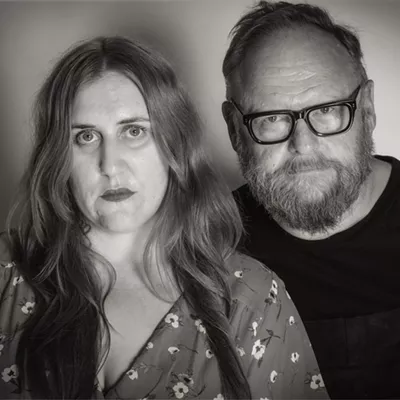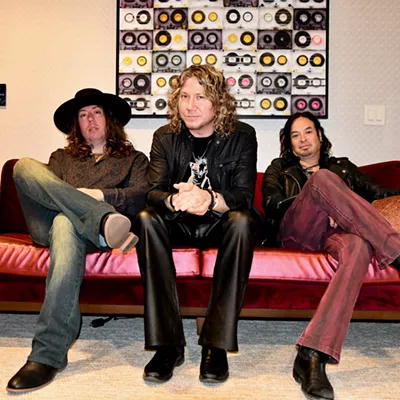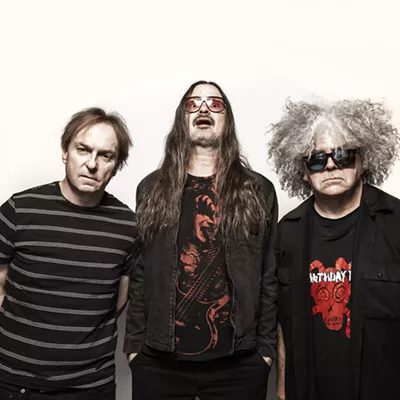One of the sad facts about being a music journalist is that you often run out of time and money to follow artists if they start to disappoint you. My record collection never included 2003's Rock N Roll--nor did it include subsequent Ryan Adams albums.
When I found out that Ryan Adams would be playing Tucson, I went out and got the Follow the Lights EP, Ryan Adams' most recent release, and found myself falling again for the artist responsible for two of my all-time-favorite albums, 2001's Gold and Whiskeytown's 2001 release, Pneumonia. It's like finding a long-lost friend, but bittersweet: Now I wish I'd never stopped following Ryan Adams in the first place.
Ryan Adams' musical career reads like an embodiment of the alt.country movement. As the singer/guitarist/songwriter for North Carolina's Whiskeytown in the mid-'90s, Adams took the legacy of Jay Farrar and Jeff Tweedy's Uncle Tupelo and ratcheted it up.
Alt.country was always supposed to remember the traditional aesthetic of artists like Hank Williams and Waylon Jennings while intentionally defying mainstream country-music norms. It was conservative in instrumentation, and punk in philosophy, and Adams seemed to have been born for this combination. With his first solo release, 2000's Heartbreaker, Ryan Adams sounded like a modern Bob Dylan, and 2001's Gold was even more electrifying--there was something poetic about songs with fiddle and twang coming out of a guy with spiked black hair and tattoos, a cigarette hanging from his mouth.
But when the debauchery started to take over, Adams' poeticism began to seem more Dylan Thomas than Bob Dylan. His meltdowns began appearing in the press--there was the infamous Nashville show in 2002 during which he kicked out a heckling concertgoer, and there were his angry calls in response to negative reviews from Pitchfork's Amanda Petrusich and the Chicago Sun-Times' Jim DeRogatis. And in 2004, in Britain, he fell off a stage and broke his wrist. His addictions to alcohol and drugs became even more intense before he finally sobered up with the help of his girlfriend.
"I snorted heroin a lot--with coke. I did speedballs every day for years. And took pills. And then drank. And I don't mean a little bit. I always outdid everybody," Adams told New York Times reporter Anthony DeCurtis in a June 2007 article that highlighted his recovery. In a 2006 profile on NPR, Adams told Jacob Ganz, "I was falling into this whole archetype of being a loudmouthed bastard, and that's not how I felt. And I felt like, let me just put these records out there. Let them speak."
In May 2005, Adams released the double-album Cold Roses with his new backing band the Cardinals, and then September 2005 saw the release of Jacksonville City Nights. 29 was released in early 2006. Easy Tiger and its companion, the Follow the Lights EP, were both released last year. These 2007 releases are in many ways a resurgence: They have Adams returning to his music sober, with that sense of impending explosion figurative rather than literal, and the music sounding all the better for it.
But it's Follow the Lights that is the most exciting record to hear. Adams' voice sounds smoother, his songs more focused and grounded, yet inspiring. The chorus of "Blue Hotel" is reminiscent of the rock-infused melodies that made some of the songs on Gold instantly memorable, and his cover of Alice in Chains' "Down in a Hole" is haunting. The title track ascends to a poetic chorus with Adams singing, "There was never anywhere to go but home." In many ways, Easy Tiger and Follow the Lights sound like Adams returning to his musical home--that place between traditional country and rock that has enough elements of each to maintain just the right amount of tension. The live studio recordings of "This Is It," from Rock N Roll, and "If I Am a Stranger," from Cold Roses, make me want to go back and hear them on their original albums and to listen to every album I missed. So far, I've found that Jacksonville City Nights has that country melancholy that Adams can infuse with honest emotion, and 29 is quietly arresting.
"Some things you just save, because they're worth playing over again," Stephen King wrote in the biographical materials for Easy Tiger's release. If you were like me and wrote Ryan Adams off, do yourself a favor, and give him another chance. He's worth playing over again.







